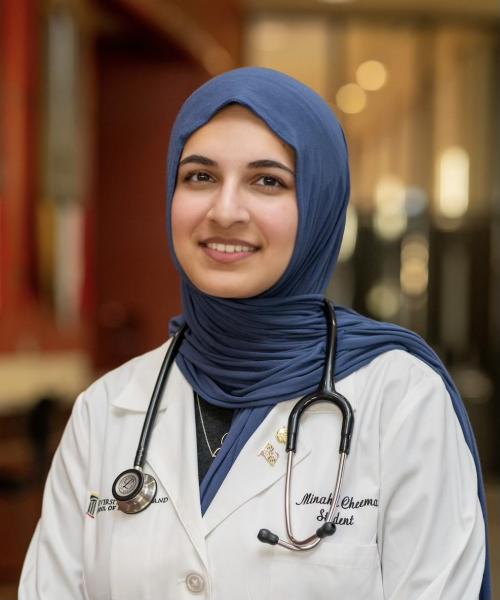Q & A with University of Maryland School of Medicine Student Minahil Cheema
Minahil Cheema graduated from UMD in 2022 with a B.S. in Physiology & Neurobiology and a minor in Public Policy. She is a student at the University of Maryland School of Medicine.
Tell us a little bit about yourself:
My name is pronounced (min-NAH-hill). In Urdu and Arabic, it means" the springs of paradise." My friends and family describe me as someone who’s flowing with energy and eager to empower others to realize their fullest potential. I spend most of my free time mentoring students and working on humanitarian projects, following the maxim, “from God we receive, to humanity we give.”
What activities do you think best prepared you for medical school?
Founding TeleShadowing helped me develop my interprofessional skills with physicians we virtually shadowed each week, which allowed for greater exposure to a wide variety of specialties that helped me specify my career interests in medical school. Further, working in government, public policy, and healthcare leadership during my upperclassmen years furthered my interests in patient advocacy and policy solutions to ensure access to equitable healthcare.
What hobbies do you have outside of medicine and how do you balance between studying and making time for other activities?
I love reading books, and I’ve been able to incorporate “reading” daily by listening to audiobooks during my drives to campus! Also, treating medical school like a full-time job helps me compartmentalize study time cut-offs during weekdays and breaks over weekends to spend time with my family.
Why did you choose the University of Maryland School of Medicine (UMSOM)?
UMSOM’s commitment to student well-being shines through from its collaborative community, faculty, students, and its schedule. We have greater time flexibility because our lectures are over by 12 PM, which provides us with the rest of the day for study and extracurricular activities.
How and when did you prepare for the MCAT?
I took the MCAT in the Spring of my Junior year. I studied for about 5 months, spending the first 2 months in content review by completing the MileDown Anki deck and actively reading through the MCAT Kaplan books to familiarize myself with core content. I treated the next 3 months as my practice questions phase using UWorld and AAMC official material. I believe the key to success is in reviewing practice questions effectively, which varies by one’s learning style.
You matriculated directly to medical school after graduation. Do you think it would have made a difference if you decided to take a gap year? Is there a stigma about medical school students who have taken one or multiple gap year(s) among the medical student community?
I wanted the best of both worlds, so I chose to graduate a year early from undergrad to spend my 4th year gaining professional experience in State Service, public health, and to further develop my startup initiatives. This allowed me to have the “gap year experience” without the gap year itself. I did this because while I have always been a student (in the traditional sense), I had not had the chance to grow as a student of life during my journey as a lifelong learner.
While I do not believe there is a stigma towards medical students who have taken gap year(s) as it is becoming increasingly common (and even incentivized in the holistic medical school admissions process), it is important to note that internationally, it is common for students to matriculate into medical school at the age of 18. Although the education systems are different from the U.S., the curricula are similar. With this exposure, it had always been my goal to matriculate into medical school before turning 20.
Is there any advice you would want to share with your younger self or with students who aspire to pursue a career in medicine in the future?
Strive to consistently compete to be the best version of yourself, instead of competing with others. When I used this paradigm as a pre-med student in college, I found myself building a community to help all students achieve their goals in medicine through nonprofit initiatives.


